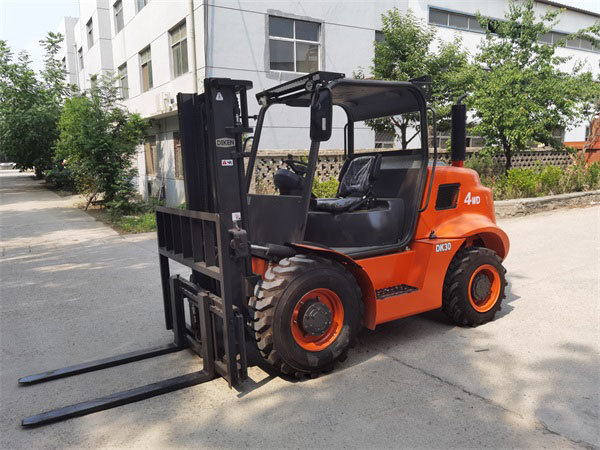Diken news
Navigating Rough Terrain: How Off-Road Forklifts Outperform Standard Models
Release time: 2025-04-05
Navigating Rough Terrain: How Off-Road Forklifts Outperform Standard Models
Introduction to Off-Road Forklifts
In industries where rugged terrain is a reality, the type of equipment used can make all the difference. Off-road forklifts have emerged as essential tools for navigating uneven surfaces, thick mud, and steep inclines. Unlike standard forklifts, which are designed primarily for flat, paved surfaces, off-road models are engineered to handle challenging environments with ease. This article delves into how off-road forklifts outperform their standard counterparts, highlighting their unique features, benefits, and applications.
Understanding the Unique Features of Off-Road Forklifts
Off-road forklifts are not just modified versions of standard models; they are purpose-built machines designed with specific features that enhance their performance in harsh conditions.
Enhanced Traction and Stability
One of the standout characteristics of off-road forklifts is their **enhanced traction**. Equipped with larger, more aggressive tires, they provide a better grip on slippery or uneven surfaces. The **four-wheel drive** capability further enhances stability, allowing these forklifts to traverse rugged landscapes without compromising safety.
Powerful Engines for Rough Terrain
Off-road forklifts typically feature **more powerful engines** than standard models. This additional power is vital for climbing steep slopes and maneuvering through challenging environments. The engines are designed to handle increased loads while maintaining efficiency, ensuring that operators can complete tasks without interruptions.
Increased Ground Clearance
With a **higher ground clearance**, off-road forklifts can easily navigate rocks, debris, and other obstacles that are commonly found in rugged terrains. This design minimizes the risk of damage to the forklift and enhances operator safety, making it an ideal choice for construction sites, farms, and outdoor warehouses.
Comparison of Off-Road vs. Standard Forklifts
To understand the superiority of off-road forklifts, it is essential to compare their features and performance against standard forklifts.
Terrain Versatility
Standard forklifts are built for smooth surfaces, making them less versatile in rough conditions. In contrast, off-road forklifts can seamlessly adapt to various terrains, from gravel and mud to grass and sand. This versatility significantly expands their operational capacity.
Load Capacity and Handling
While both standard and off-road forklifts can handle substantial loads, off-road models often come with enhanced load-handling capabilities. Their design allows them to lift heavier weights while maintaining stability, especially on uneven ground. This attribute is particularly important in industries like construction and agriculture, where heavy lifting is routine.
Durability and Maintenance
Off-road forklifts are built to endure harsh conditions, featuring robust materials and construction methods that enhance their durability. Standard forklifts, while reliable on flat surfaces, may require more frequent maintenance when exposed to rough terrain. The rugged design of off-road models reduces wear and tear, resulting in lower long-term maintenance costs.
Applications of Off-Road Forklifts in Various Industries
Off-road forklifts are invaluable in numerous industries where challenging terrain is a common factor.
Construction Sites
In construction, off-road forklifts are essential for moving materials across uneven ground. They facilitate the transport of heavy loads, such as steel beams and heavy machinery, directly to the site where they are needed, significantly improving efficiency.
Agricultural Operations
Farms often face various terrain challenges, from muddy fields to hilly landscapes. Off-road forklifts can navigate these conditions, making them perfect for transporting feed, equipment, and harvested crops, ensuring that operations run smoothly.
Forestry and Landscaping
In the forestry and landscaping sectors, off-road forklifts are used to transport logs and other materials through rugged terrain. Their ability to maneuver in challenging environments reduces the need for additional equipment, streamlining operations.
Advantages of Using Off-Road Forklifts
The benefits of choosing off-road forklifts extend beyond their unique features.
Increased Productivity
By enabling operators to work efficiently across various terrains, off-road forklifts significantly boost productivity. They reduce the time spent transporting materials and increase the overall speed of operations.
Enhanced Safety for Operators
Safety is paramount in any work environment. Off-road forklifts are designed with safety features that minimize the risk of accidents, such as improved visibility for operators, a lower center of gravity for enhanced stability, and robust frames to protect against rollovers.
Cost-Effectiveness
While off-road forklifts may have a higher initial purchase price, their durability, versatility, and reduced maintenance costs make them a cost-effective solution in the long run. Industries that rely on heavy lifting in harsh conditions find that the investment pays off quickly.
Factors to Consider When Choosing an Off-Road Forklift
Selecting the right off-road forklift requires careful consideration of various factors to ensure it meets your operational needs.
Weight Capacity Needs
Understanding the weight capacity you need is crucial. Off-road forklifts come in various sizes and capacities, so evaluating your typical load sizes can help narrow down your options.
Terrain Characteristics
Consider the type of terrain where the forklift will be used. If you anticipate navigating particularly rough landscapes, prioritize models with superior traction and ground clearance.
Fuel Efficiency
Given the potentially high operational costs, fuel efficiency is a significant consideration. Look for off-road forklifts that offer powerful performance without sacrificing fuel economy.
Maintenance Tips for Off-Road Forklifts
To maximize the lifespan and performance of off-road forklifts, regular maintenance is essential.
Regular Inspections
Conduct routine inspections to identify any wear or damage. Key areas to focus on include tires, brakes, and hydraulic systems. Early identification of issues can prevent costly repairs and downtime.
Proper Cleaning
Keep the forklift clean to prevent dirt and debris buildup, which can affect performance. Regular washing, especially after operating in muddy or dusty conditions, is essential.
Scheduled Service
Establish a maintenance schedule that includes oil changes, filter replacements, and system checks. Following the manufacturer's guidelines for servicing will ensure optimal performance and longevity.
FAQs About Off-Road Forklifts
1. What are the key differences between off-road and standard forklifts?
Off-road forklifts are designed for rugged terrain, featuring enhanced traction, powerful engines, and higher ground clearance compared to standard forklifts, which are suited for smooth surfaces.
2. In what environments are off-road forklifts most effective?
They are most effective in construction sites, agricultural operations, forestry, and any environment with uneven or challenging terrain.
3. Can off-road forklifts handle the same loads as standard models?
Yes, many off-road forklifts can handle heavier loads while maintaining stability, making them ideal for demanding applications.
4. How often should off-road forklifts be serviced?
Regular servicing is essential, typically every few months or as recommended by the manufacturer, depending on usage frequency and conditions.
5. Are off-road forklifts more expensive than standard models?
While the initial purchase price may be higher, off-road forklifts can save money in the long run due to their durability and lower maintenance costs.
Conclusion
Off-road forklifts play a crucial role in enhancing productivity and safety across various industries where challenging terrains are the norm. Their unique features, including enhanced traction, powerful engines, and superior durability, enable them to outperform standard models significantly. By choosing the right off-road forklift for your operational needs and ensuring regular maintenance, you can maximize efficiency and safety in your work environment. Investing in off-road forklifts not only increases productivity but also provides a robust solution for navigating the unique challenges presented by rough terrain.
Keywords: off road forklift










